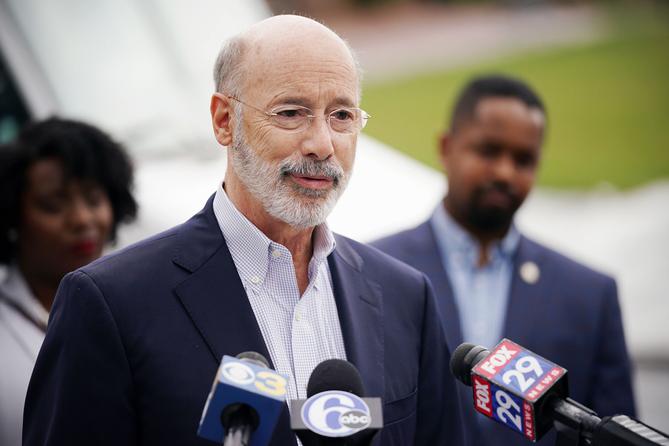Capitol Notebook by Spotlight PA provides updates on important news and notes from the halls of power in Harrisburg. Sign up for our weekly newsletter.
Gov. Tom Wolf on Wednesday proposed using $1 billion in state funding, typically set aside for capital projects, to remediate lead- and asbestos-tainted schools, an issue that has been particularly acute in Philadelphia.
“Decades ago, well-intentioned Pennsylvanians constructed our homes, our schools, our water systems, and other structures out of asbestos and lead because we thought they were harmless,” Wolf said. “Now we know the serious harm both cause.”
The proposal, which comes as Wolf prepares to unveil his 2020-21 budget next week, would make $1 billion in grants available to schools through an expansion of the state’s Redevelopment Assistance Capital Program.
“I think that’s the magnitude of this problem, and this is specifically for toxic schools,” Wolf said.
The news was welcomed in Philadelphia, where a growing asbestos crisis has forced the closure of six schools and an early childhood education center since the start of the school year. In September, the Philadelphia Federation of Teachers announced that one of its members, a career Philadelphia teacher, had been diagnosed with mesothelioma, a deadly cancer linked to asbestos exposure.
After that diagnosis, officials began paying much closer attention to asbestos issues. School District buildings are old and 175 contain asbestos, the district said. Undamaged asbestos is not a threat, but damage can release microscopic fibers that can cause cancer when inhaled.
“I am extremely encouraged that the governor is taking our voices seriously and has developed a plan to bring relief,” said Jerry Jordan, president of the Philadelphia Federation of Teachers, which is suing the Philadelphia School District over asbestos contamination.
“[W]e will also continue to relentlessly pursue immediate relief," Jordan added. “We urge the governor to declare a state of emergency in our schools and utilize the rainy day fund to address the daily crisis that we are facing.”
Philadelphia Mayor Jim Kenney also commended the effort to focus on the state’s aging school buildings.
“These investments can no longer wait, and I sincerely appreciate Gov. Wolf’s leadership on this critical issue. He’s clearly heard and responded to our urgent call for more state support,” Kenney said.
It was unclear how much support Wolf’s proposal would have in the Republican-controlled legislature. During Wednesday’s news conference, the governor was flanked by fellow Democrats, but no Republican lawmakers were present.
Mike Straub, a spokesperson for the state’s House of Representatives majority party, said that House Republicans look forward to discussions with lawmakers and the administration in the upcoming months.
“Discussions around budget priorities and spending are just underway,” he said in a statement Wednesday.
Under the plan, Wolf also proposed smaller funding investments to address lead and other contaminants in drinking water and in buildings where children are present.
Pennsylvania has submitted a grant application to the U.S. Environmental Protection Agency to fund more voluntary drinking-water testing at 3,000 schools and day-care centers.
On Wednesday, Wolf and other lawmakers spoke about the harms that lead can cause, to young children especially.
State Sen. Vincent Hughes (D., Phila.) invoked the story of Dean Pagan, who suffered long-term health consequences after eating lead chips at Watson Comly Elementary in Northeast Philadelphia. He was featured in the Inquirer’s “Toxic City” series.
“We need to be reminded that although lead paint was banned in 1978, the average age of Pennsylvania schools is 70 years,” he said. “Seventy percent of Pennsylvania’s housing stock was built prior to 1978. Ninety percent of the Philadelphia housing stock was built prior to 1978.”
It would cost about $175 million to fix all the urgent lead, mold, and asbestos issues inside Philadelphia schools, a coalition of lawmakers and union officials has said.
“Too many Pennsylvanians live their lives in toxic homes, send their babies to toxic day-care facilities, and allow their children to attend toxic schools,” Hughes said. “Every day, we find more information that says how bad the situation is,” he added, noting that a report released Tuesday found that all but four school buildings in Scranton have asbestos.
Philadelphia Inquirer staff writer Kristen A. Graham contributed to this article.
Spotlight PA receives funding from nonprofit institutions and readers like you who are committed to investigative journalism that gets results. Become a Founding Donor today at spotlightpa.org.

